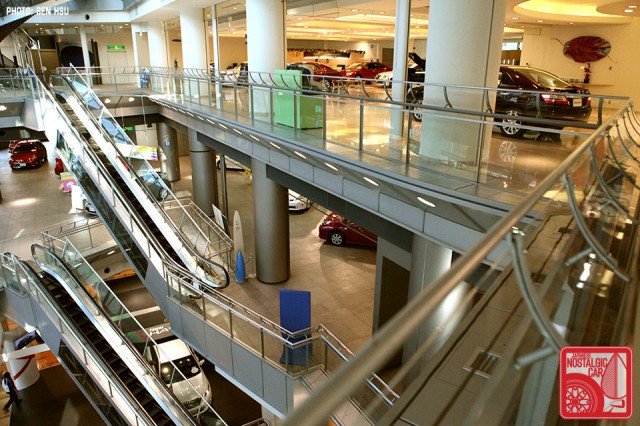
Today marks the end of a Tokyo institution. Toyota‘s Amlux showroom is closing after 23 years of operation. Most residents of Japan’s constantly morphing metropolis probably didn’t even notice, but for die-hard Toyotaku it’s the end of an era.
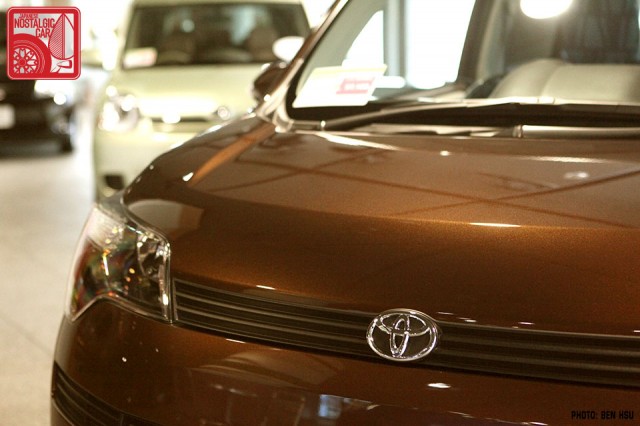
For gaijin Toyota enthusiasts, Amlux was Mecca. Every single JDM car sold by Toyota was gathered under one roof. You could kick the tires and set your butt on the upholstery of each one, from the bizarrely cute Japan-only Porte to the king-daddy of them all, the Toyota Century.
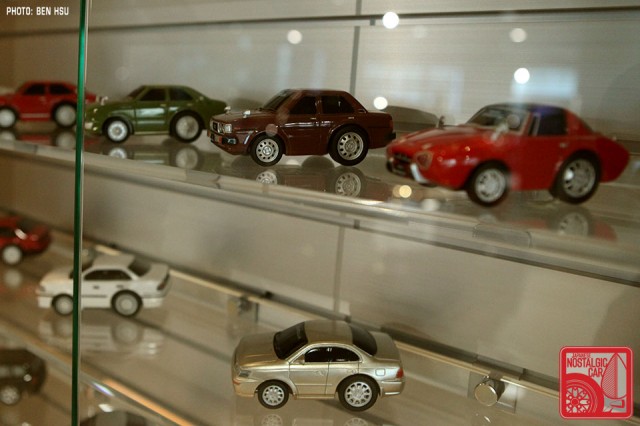
If you got tired you could take a break by sipping a drink at Amlux’s cafe. Or, buy some minicars and car parts at the TRD store. Sometimes there were concerts or crafts events for kids. Best of all, you could accumulate a backbreaking stack of JDM brochures (except for the Century’s) as you climbed five stories filled with Aichi steel.
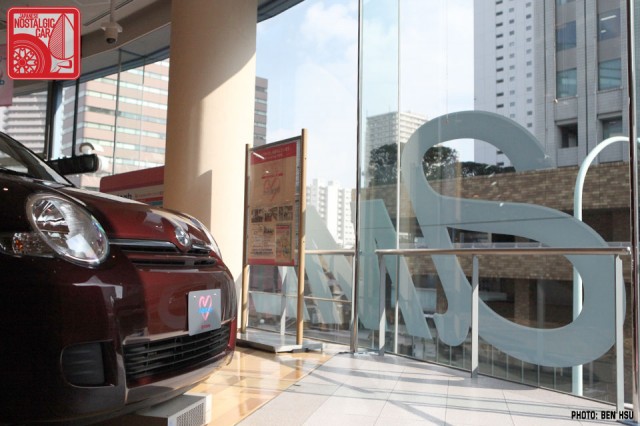
In fact, the only thing you can’t do there is actually buy a car. Amlux is not a dealership. Its official name is Toyota Auto Salon Amlux, and it’s wholly owned by the Toyota Motor Corporation.
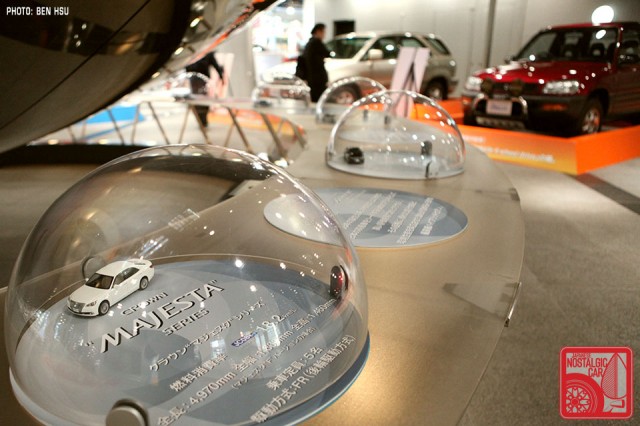
Amlux opened in 1990, on the tail end of the Bubble Economy when it seemed like Japanese corporations, especially automakers, were unstoppable. It purpose was simply to grant residents of a crowded city easy access to Toyota’s lineup and subtly remind them of its juggernaut omnipresence.
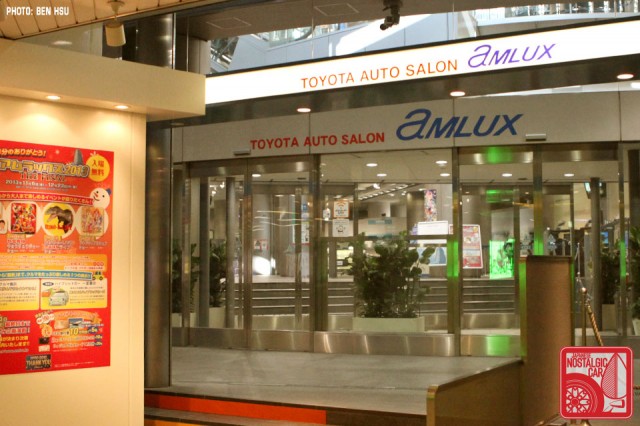
Toyota says it’s closing Amlux to consolidate it with Megaweb, another, bigger showroom on the opposite end of Tokyo. It won’t be the same though, as brochures are purchased there — like many Japanese products — via vending machines at ¥300 ($3) a pop when we last checked. At Amlux they’re free.
Before Amlux closed for good, however, we took one last spin around this landmark. There are two entrances, one at street level and one in the basement. The lower one (shown here) connects to a large underground shopping mall (that, incidentally, contains a must-visit Toys R Us for minicar collectors).
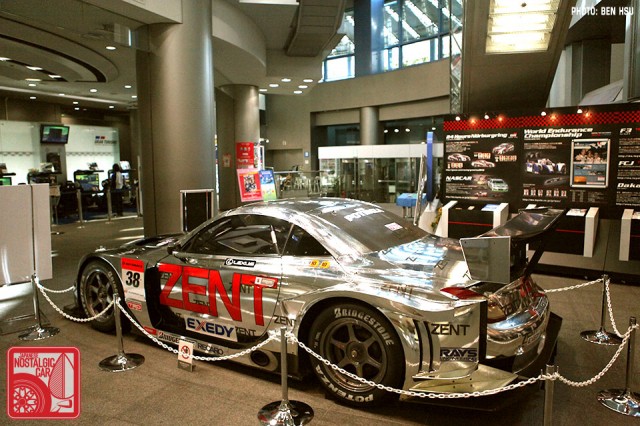
Entering through the basement takes you to a small stage and display area. There were also Gran Turismo arcade cabinets offering free games as long as you chose a Toyota . The only car on this level was the gleaming Zent Cerumo Lexus SC430 driven by Yuji Tachikawa and Kohei Hirote, champions of the 2013 Super GT season.
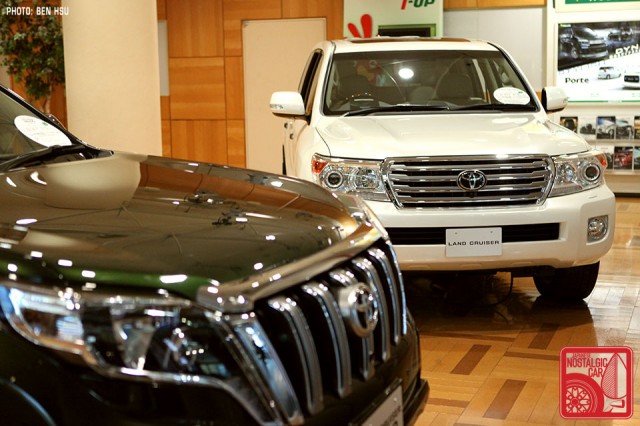
Each floor has a theme, and the second floor was reserved for Toyota SUVs (we’ll circle back to ground level before leaving). Amazingly, as large as it is Amlux doesn’t contain any Lexus vehicles, nor does it harbor any of Toyota’s subsidiary brands like Hino or Daihatsu. In any case, Lexus Japan doesn’t sell SUVs so there is no LX or GX. In fact, the Land Cruiser Prado‘s (foreground) grille is much nicer and more elegant than the US-market Lexus version’s.
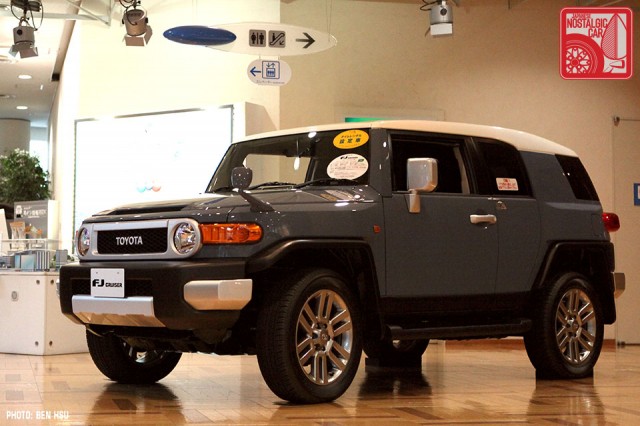
SUVs in Japan used to have, in addition to door mirrors, a fender mirror on the left (passenger) side. An array of electronic sensors have replaced them on high-end trucks, but rigs like the FJ Cruiser still have them.
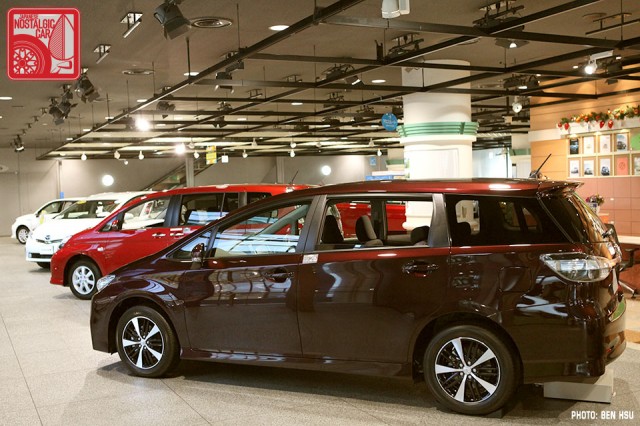
The third floor was comprised of “normal” cars that are neither luxury nor off-roader — compacts, sedans and minivans. There’s a whole slew of wonderful wagons like the Toyota Wish (foreground) or Noah minivan (red) that we are denied in the US.
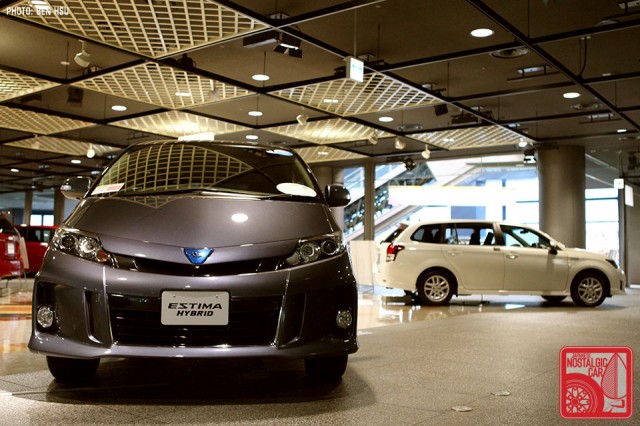
The Previa may have been a one-generation model in the States, but in Japan it’s on its third sleek iteration and is offered as a hybrid to boot. Japan also has the Corolla Fielder, basically a fancy name for a Corolla wagon. Amlux’s example isn’t covered in denim like the one at the Tokyo Motor Show but even in plain white it’s kind of cool, and is a body style not seen stateside since 1998.
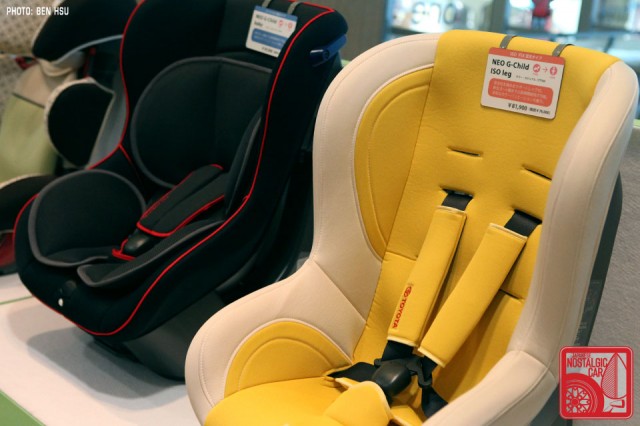
The Toyotaku with a family could spring for a Toyota child seat, offered in several different styles and colors.
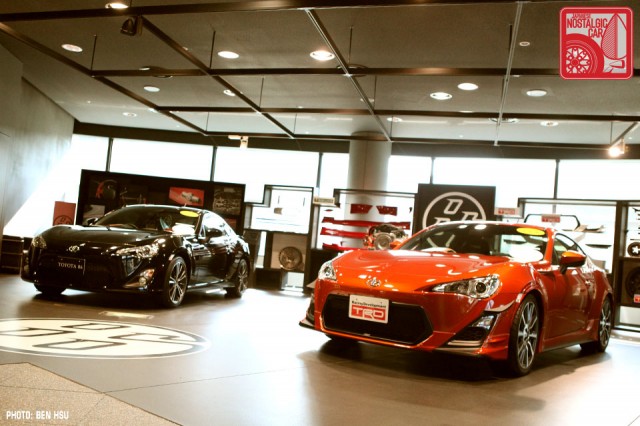
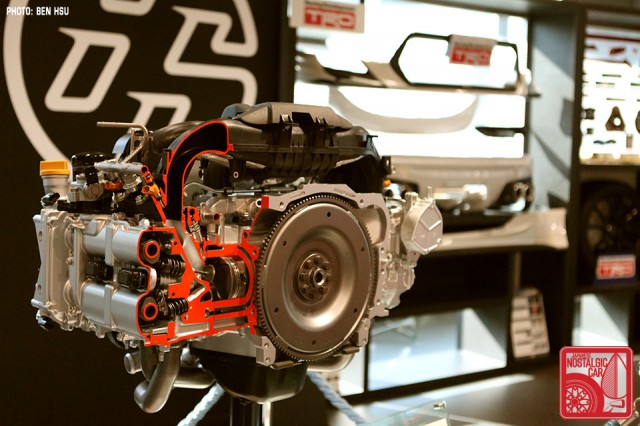
The third floor also housed a special section for the Toyota 86. The neo-hachiroku was displayed with an array of TRD parts and accessories, but they weren’t for sale. When we first visited Amlux 10 years ago, this area was occupied by a TRD shop where all sorts of goods from apparel to keitai charms could be purchased.
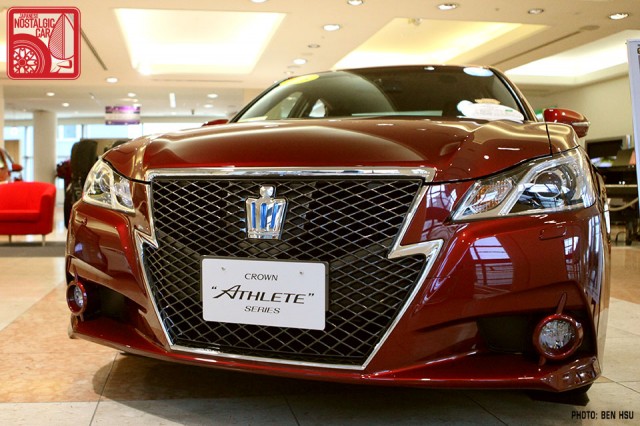
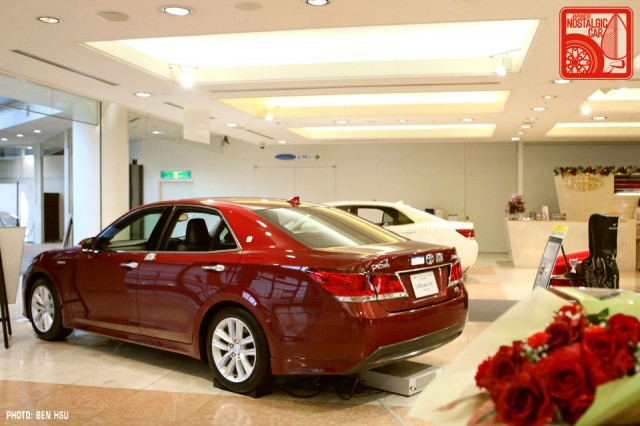
The fourth and top-most floor has always housed the luxury cars. The new Crown, which debuted last year in hot pink, was featured heavily. A bouquet of fresh roses sat atop a self-playing grand piano churning out classical music, just in case you weren’t feeling sophisticated enough.
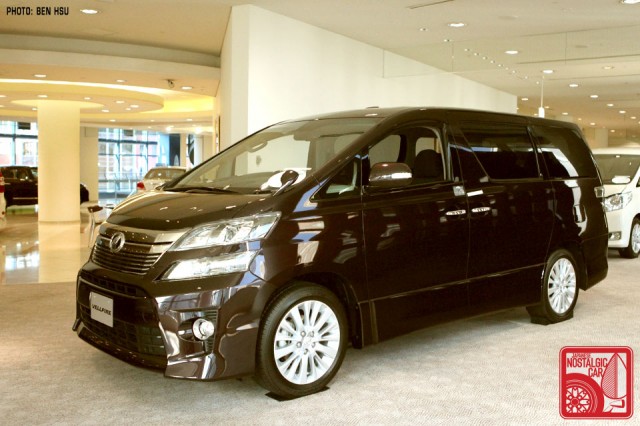
Behold the Toyota Vellfire, one of the grandest minivans money can buy. It can be fitted with recliner seats in the back, complete with footrest and pop-up ottoman. We got a lot of flak for our Toyota Sienna SE review but in Japan driving a van is nothing to be embarrassed about. Instead, Vellfires (and their Alphard twin) are often modded and slammed in VIP fashion.
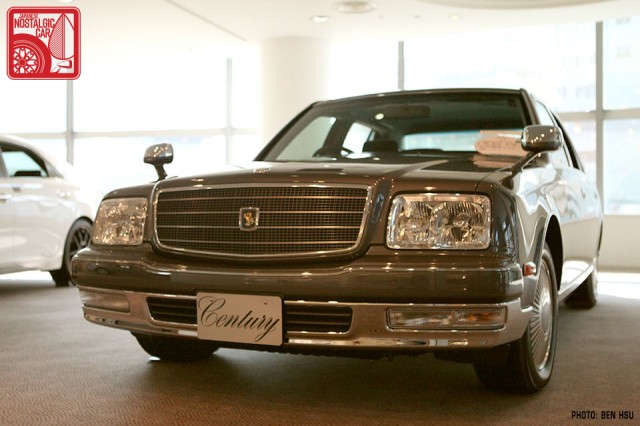
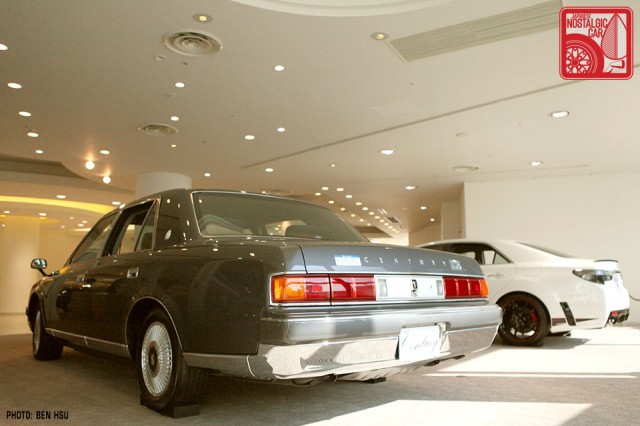
Of course, the top dog of them all is still the Toyota Century, the most understated signifier of status in the world. Not only must one be a true Very Important Person to buy the bespoke-V12 powered sedan, they won’t even give normals like us a brochure.
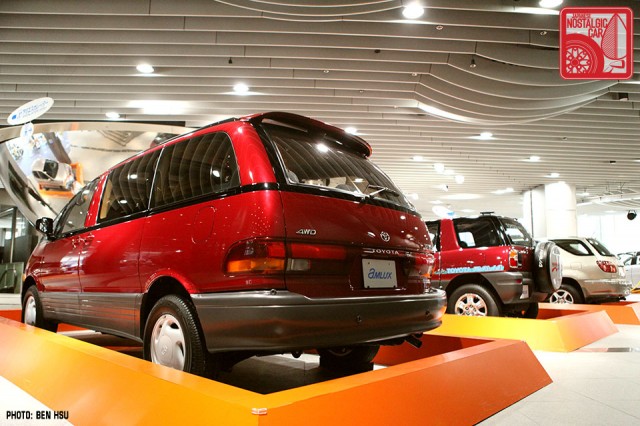
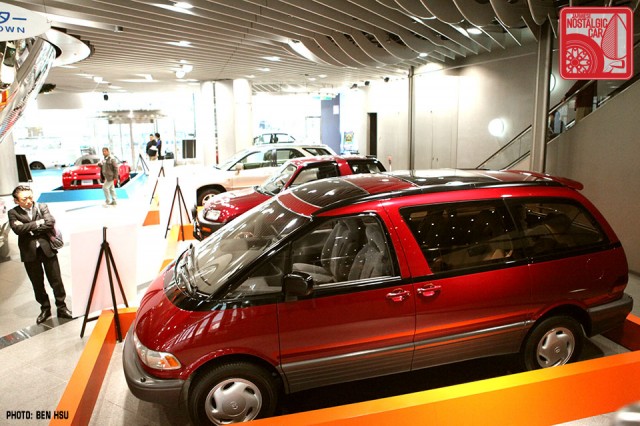
We started our tour in the basement but the first floor is really the main entrance. We wanted to save the best for last, and apparently so did Toyota. Amlux opened its doors on September 25, 1990, so what better way to end the show than with a special exhibition of Toyota’s greatest hits from that decade?
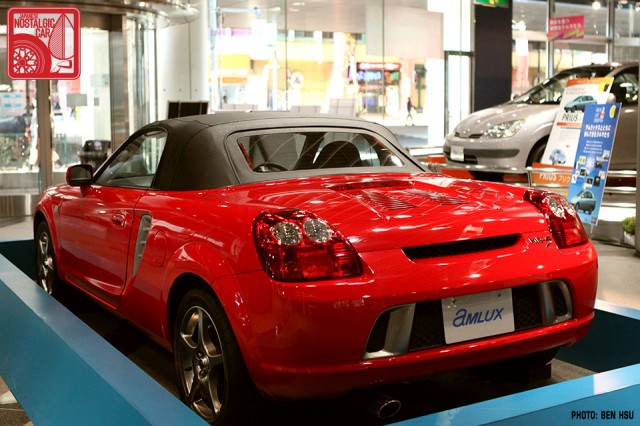
For Amlux’s last hurrah, Toyota brought out a collection of mint 1990s cars. The MR-S (or MR2 Spyder as it was known in the US) was always overshadowed by the Miata but it was a fantastic roadster in its own right. For a while, it seemed as if it would be the last sports car Toyota would ever build.
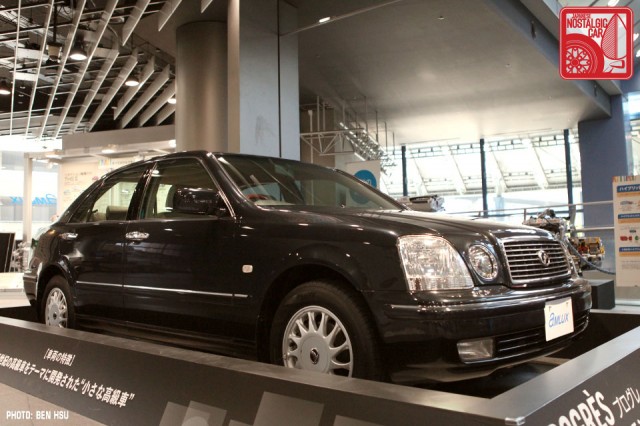
The Toyota Progrés was a quasi-classical but stately design for a mid-sized, RWD sedan that featured direct-injection straight sixes from the legendary 1JZ and 2JZ family. Though it shared a platform with the Altezza (Lexus IS 300) and was roughly the same size, it was tuned for luxury and comfort rather than sport.
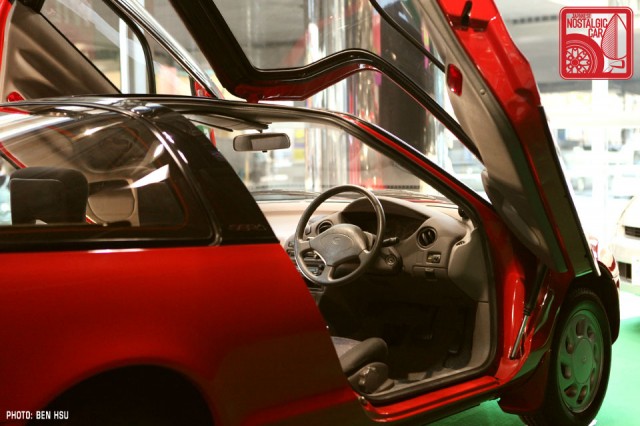
In the 90s Japanese automakers were still daring enough to produce bizarre models like the Toyota Sera. Noted for its striking design, featuring a large glass canopy and butterfly doors, it has a global cult following nowadays even though it was never sold overseas.
Our only gripe is that the red car displayed is not an Amlux special edition. Those came in a two-tone green with blue-tinted glass and the Amlux logo on the doors. Supposedly only 21 were built in late 1992 to commemorate what was then the world’s largest single showroom.
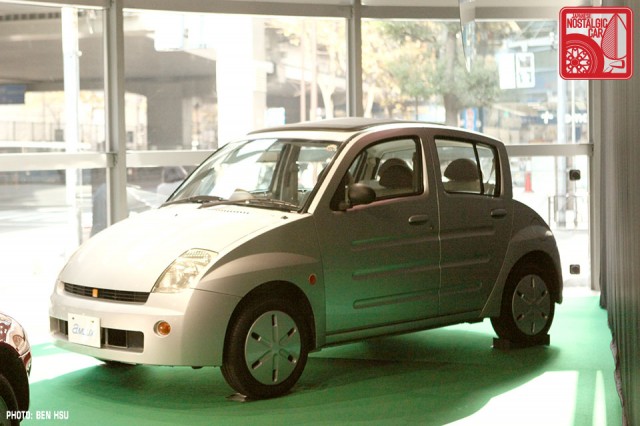
In the 90s Toyota also experimented with a sub-brand called WiLL. It teamed up with other Japanese companies ranging from Panasonic to Asahi Brewery to create a series of hip lifestyle stores. The idea was that you could go into a WiLL store and buy everything you need from Kokuyo stationery to cars like the WiLL Vi. The cars were somewhat popular but Japanese didn’t really get the stores. The project was closed down in 2004.
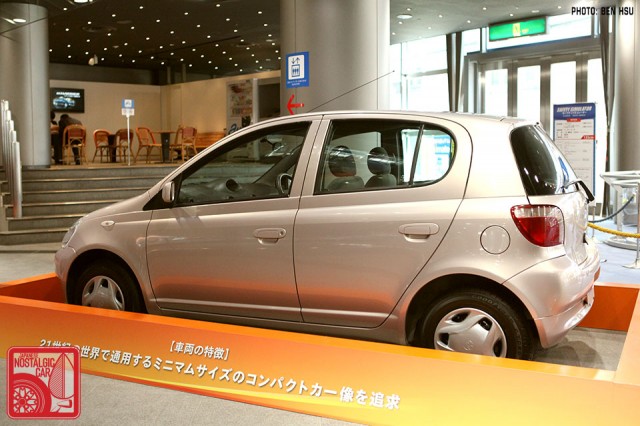
Before Yaris, there was the Vitz. Introduced as a successor to the Starlet, the first generation won both Japan and European Car of the Year awards, but was sadly never sold in the US until the second generation. Most Americans probably recognize this as an beginner’s car in Gran Turismo.
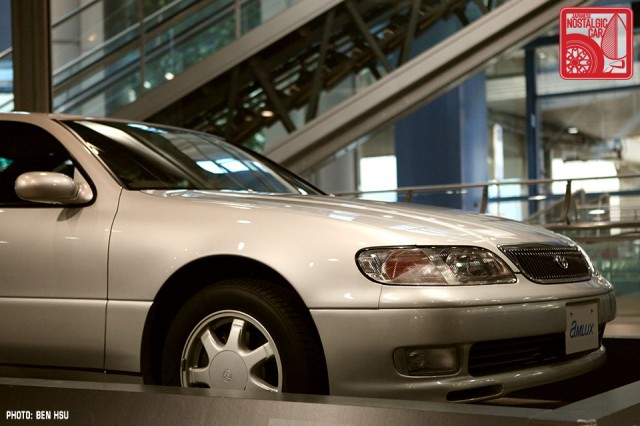
Remember when Lexuses still had Toyota counterparts in Japan? The Aristo also hails from a time when it was perfectly acceptable for a luxury car to have 16-inch wheels. And let’s not forget, it’s what Jay-Z rocked in his early days.
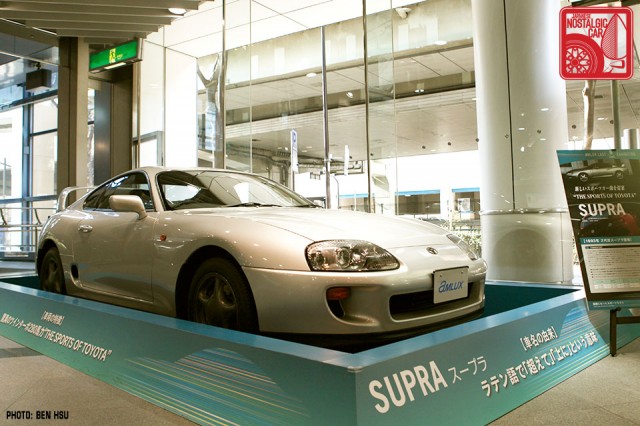
If there was ever a car that defined Toyota in the 1990s it was the JZA80 Supra. In twin-turbo guise its performance was near supercar territory. Tragically, its incredible tuning capacity also made it a target for modders and put bone stock examples like this one on the endangered species list.
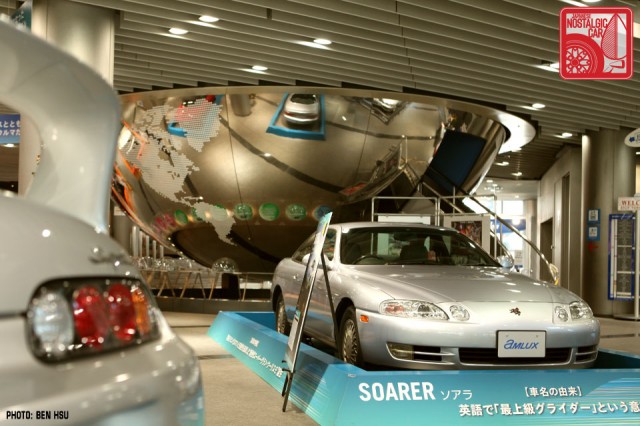
The Supra’s platform twin, the Z30 Soarer, or Lexus SC, was a stunningly gorgeous design for its time. It was, and still might be, the most beautiful Lexus ever built. It made us nostalgic for a time when Japan’s cars, with all their quirkiness, were transplanted directly to the US market for consumption. Nowadays the American lineup looks like its from completely a different company.
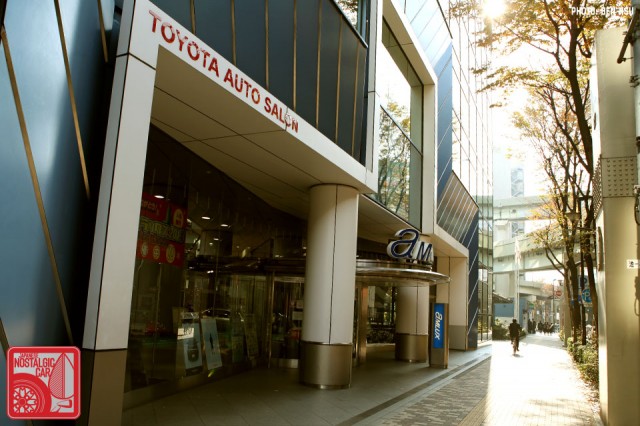
Toyota’s plan to have Megaweb as their sole Tokyo showroom seems questionable, though. Tokyo has just won the bid for the 2020 Olympics, and Megaweb’s Odaiba location is supposed to be re-developed before that takes place.
But that’s Japan for you, ever changing. Seeing Toyota’s 90s machines, in person and just as they were when new, served as a good reminder of that as we bid farewell to Amlux for the last time.



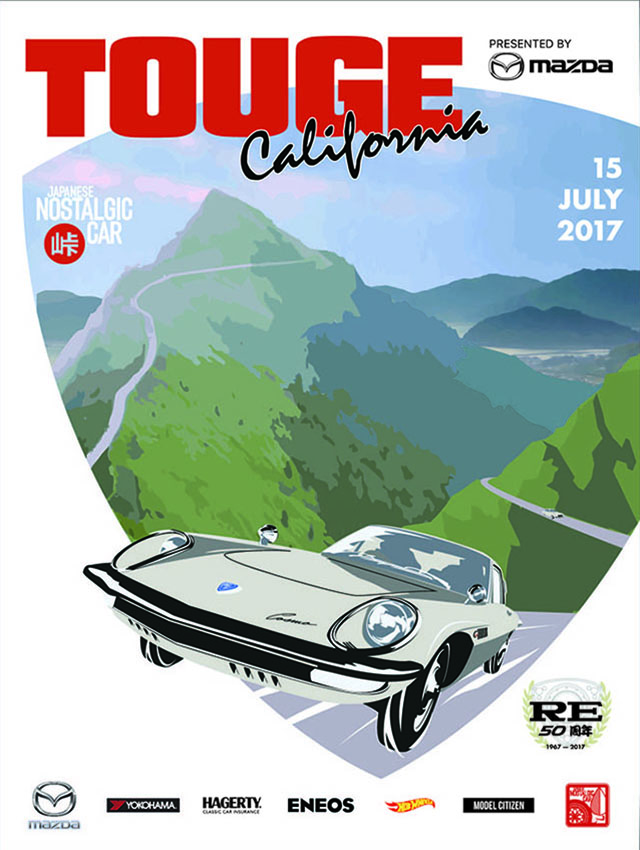

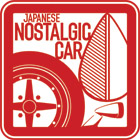
toyota would be completely souless– if it werent for the toyobaru
I dunno, I wouldn’t mind rocking a Century or Crown. Or even a Vellfire.
Another thing I won’t get to see, once I get to Japan.
When do the doors shut for good ?!!?! Is there a date exactly?
Well, NVM I guess I missed the opening line. Whoops.
What a shame this is closing! I could probably spent a whole day in there and never want to leave! Any argument of Toyota being *beige* is rendered hogwash by seeing all the cool cars it’s produced over the years, as seen in these photos. That trio of silver cars towards the end–the Aristo, Supra, and Soarer–is the epitome of nostalgia for me. I’ve always loved those original Aristo/GS; such a sleek and handsome design by Giugiaro. I knew two kids in high school whose parents had one, but for the most part it was a rare car noticed by few. And the original SC, that’s simply a masterpiece even Toyota itself hasn’t really topped. The Supra is so iconic of that time and the kids I grew up with. Seeing these three really brought back memories. Randomly, i remember reading about the Progres in Car and Driver and impressed by some weird technology: material in the windshield (or was it mirror) that degrades dirt, and GPS that can downshift the transmission when the car is coming up on a curve. I also loved those Previa with the dual moonroof. I petitioned hard for my mom to buy one, but no dice. The Sera was really beautiful, but I read that it’s not that exciting to drive. And the MR-S is just so underrated. I guess I’m a Toyota otaku.
This is an impressive collection and display. If they move most or all of it to the other, bigger showroom, then I think it’s all good. It must be expensive to operate something like this, I’m surprised any car company still does it. I’ve been to the Peugeot and Renault stores in Paris, which are cool, but this looks to be on a whole different level. What a shame I’ll never get to see it =(
Megaweb is bigger and newer, but for some reason it seems a bit more run down than Amlux. There are some cool features like the car elevators which have been shut down for years. (cars are stacked in glass towers and theoretically can be brought down for closer inspection when you choose them from a menu).
Amlux always had that nostalgic feeling and was less of a zoo. Plus the higher levels peeked right over the Metropolitan Expressway’s Ikebukuro route and served as a cool landmark. And the brochures were free (except the Century’s). Now in order to collect all the brochures you want you have to hit up 3-4 different dealerships (Toyota has multiple sales channels in Japan).
Oh no!
Another of my favourite spots in japan closing.
The first time I visited I sat in a cardinal. I marvelled at why australia didn’t get such a good looking wagon fitted with a gt4 driveline!
You mean the Caldina? You can get them as imports now….
I have owned 34 Toyotas since 1976 and have a great respect for them. Always wanted a twin turbo Supra, just never had the money. I still have a gen. 1 MR2 with a bunch of horsepower though.
You can’t be serious ! I walked pass the Amlux by night last week and thought I had to come back by day to check it out…
Are they transferring all the cars to MegaWeb?
Sorry man, it’s true. The new cars will probably be mixed in with Megaweb’s. The 90s cars will likely return to Toyota’s collection and be brought out periodically for display.
Too bad itasha toyotas are also disappeared….hope it will be in megaweb in odaiba…
There is a Sera sitting at Andy’s auto wreckers in Melbourne complete. They want 2 or 3k for it if I recall. I was there only a couple of weeks ago. Unfortunately they scraped 95% of their wrecking yard stock 🙁
I forgot to say it’s a metallic green colour, not sure if it’s one if the rare ones refered to in the artical. They are a small odd looking car with all that glass.
Metallic green was offered on regular ones. If it was two-tone then there’s a chance it could’ve been an Amlux Edition.
Us Canucks were fortunate enough to get the 1st gen Vitz (Echo hatchback) midway through the model cycle. Much handsomer and practical than the sedan and a few have been flogged around autoslalom courses to some success in stock class.
My thanks to Autoweek for telling us about this virtual tour. There are so many Toyota models that we will never see in the United States. I had no idea that a Toyota V-12 even existed. The Century has me intrigued. What a beautiful vehicle in that it has the understated style and elegance that is missing in today’s models. Cars that have the racer boy or sporty look just do not serve any purpose. The Century just looks very nice for those that can afford it. What a place that is closing. Why not move the whole thing to the USA? That would bring the fan boys and girls from all over. Toyota, just keep doing what your doing. Anvil tough and creature comfort, even now the styling team is catching up with engineering.
wow
I was in Amlux long time ago
m so excited to visit again
Mohsen abu Nijim
LEXUS NOW
in Kuwait now
I am American and lived in Japan in the early 90s. I did the radio commercial for Amlux.